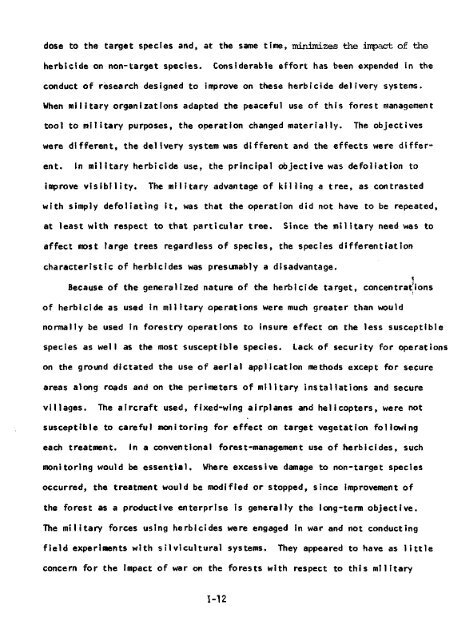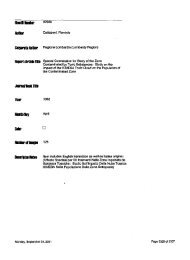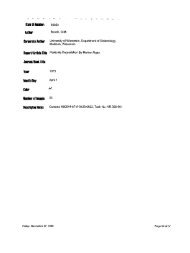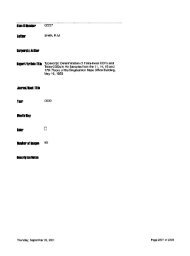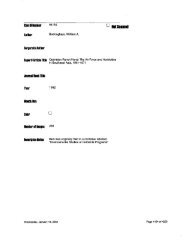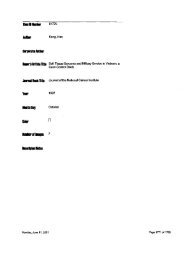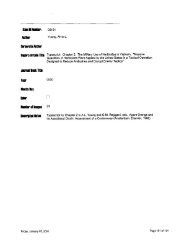- Page 1 and 2: Item D Number ^sse D Not ScannedAut
- Page 3 and 4: THE EFFECTS OF HERBICIDES IN SOUTH
- Page 5: I. Introduction
- Page 8 and 9: such a manner as to permit Its exte
- Page 10 and 11: for Cambodia east of the Mekong Riv
- Page 12 and 13: Inhibited by the absence of a fores
- Page 16 and 17: activity as they and their predeces
- Page 18 and 19: subjected to other military actions
- Page 20 and 21: forest experiment stations in Thail
- Page 22 and 23: SOUTH CHINA SEAFigure 1-2 Military
- Page 24 and 25: References Cited(1) Gartuer, E. J.
- Page 26 and 27: II.The History of Human Use of the
- Page 28 and 29: Cambodian Inventory project says wi
- Page 30 and 31: Cambodia's 33»700 square miles of
- Page 32 and 33: It Js useful to examine some of the
- Page 34 and 35: tree crown densities prior to the I
- Page 36 and 37: Both cultivated areas and grassland
- Page 38 and 39: APPENDIX .1A Study of Succession fr
- Page 40 and 41: The permanent denuded quadrat was o
- Page 42 and 43: emoved. Ourlnq the 1
- Page 44 and 45: trends are still directed toward dr
- Page 46 and 47: Table II-l (cont. - 2)SpeciesTotal
- Page 48 and 49: Table II-2Species abundance in seed
- Page 50 and 51: Table II-3Species from sapling enum
- Page 52 and 53: Table II-4 (Cont. - p. 2)SpeciesTot
- Page 54 and 55: Table II-6Species abundance from sa
- Page 56 and 57: Table II-7 (Cont. - p. 2)SpeciesTot
- Page 58 and 59: (9) Nuttonson, M. Y., 1963.The phys
- Page 60 and 61: A. Identification of Forest Feature
- Page 62 and 63: Beforereviewing the methods by whic
- Page 64 and 65:
from that of temperate forests.The
- Page 66 and 67:
(Tectona grand is) can be readily s
- Page 68 and 69:
Swellengrebel (37) has found that u
- Page 70 and 71:
B. Comparison of use of Photogramme
- Page 72 and 73:
where H = tree height, CA = crown a
- Page 74:
coefficients were fairly high (r=0.
- Page 77 and 78:
therefore would be more easily Iden
- Page 79 and 80:
The third approach was to estimate
- Page 81 and 82:
dominantly terrestrial. This is due
- Page 83 and 84:
provide only a "very rough estimate
- Page 85 and 86:
C. Stem Diameter/Crown Diameter Rel
- Page 87 and 88:
without the factors of density and
- Page 89 and 90:
existing Information from other cou
- Page 91 and 92:
Analysis of covarlance was used to
- Page 93 and 94:
obtained by many other investigator
- Page 95 and 96:
Sampling grid9 x 18 » 162quadrats1
- Page 97 and 98:
Table III-lNumber of Quadrats Havin
- Page 99 and 100:
Mean number of dead12merchantable t
- Page 101 and 102:
E. Errors in Tree Counting and Volu
- Page 103 and 104:
Figure III-2J-shaped curve of Tree
- Page 105 and 106:
the commercial trees are usually at
- Page 107 and 108:
error is the smallesttrees which ha
- Page 109 and 110:
Random ErrorEven if a well-trained
- Page 111 and 112:
all but the random error by use of
- Page 113 and 114:
11. _ 19S9. The Application of Aeri
- Page 115 and 116:
31. Richards, P. W. 1952. The Tropi
- Page 117 and 118:
I. INTRODUCTIONThe task of the fore
- Page 119 and 120:
Figure IV-1DIAMETER-HEIGHT RELATION
- Page 121 and 122:
Figure IV-2DIAMETER-HEIGHT RELATION
- Page 123 and 124:
tuberculatus tree just discussed ha
- Page 125 and 126:
In five-meter log components.The vo
- Page 127 and 128:
volume at any given time, Is also a
- Page 129 and 130:
concerning stand structure while es
- Page 131 and 132:
following:total heights, inventory
- Page 133 and 134:
species, thus increasing the utiliz
- Page 135 and 136:
computed by the following integrati
- Page 137 and 138:
D. Exploitable Merchantable Volume
- Page 139 and 140:
TABLE IV-6. Exploitable Merchantabl
- Page 141 and 142:
ased upon samples of species compos
- Page 143 and 144:
METERS50 J4O J?METERS
- Page 145 and 146:
extensively by man, they are not co
- Page 147 and 148:
12 3VT - Z Z Aa.n.s .v.1=1 j=l ' '
- Page 149 and 150:
Table IV-10. Volume SummaryType of
- Page 151 and 152:
Table IV-12. Inventory Total Volume
- Page 153 and 154:
Table IV-14. Inventory Merchantable
- Page 155 and 156:
Table IV-16. Exploitable Merchantab
- Page 157 and 158:
(8) Sandrasegaran, K. 1971."Height-
- Page 159 and 160:
crop. If there is not a sufficient
- Page 161 and 162:
B- Exploited hardwood forestsA larg
- Page 163:
or even extensive areas of timber,
- Page 167 and 168:
Vulnerability of forest stands to a
- Page 169 and 170:
Table V-l. Crown Characteristics of
- Page 171 and 172:
Study of the forests of South Vietn
- Page 173 and 174:
the trees continued to grow.The tas
- Page 175 and 176:
Having been satisfied that the prot
- Page 177 and 178:
commercial species. That is, the de
- Page 179 and 180:
Military Region 3.This step, theref
- Page 181 and 182:
the number of loss model trees givi
- Page 183 and 184:
per tree which is in agreement with
- Page 185 and 186:
crownwood yields an estimate of woo
- Page 187 and 188:
was not a responsibility of the Com
- Page 189 and 190:
Figure V-lUnsprayed forest showing
- Page 191 and 192:
Figure V-3Appearance of very old bo
- Page 193 and 194:
manufacturing problems; production
- Page 195 and 196:
of the overstoryforest cover except
- Page 197 and 198:
extensive aerial reconnaissance and
- Page 199 and 200:
total area, film j - obtained from
- Page 201 and 202:
Table V-l. Basic Data Used in the L
- Page 203 and 204:
Table V-2. Results of the loss Made
- Page 205 and 206:
gains are rapid until some point af
- Page 207 and 208:
species, and environmental conditio
- Page 209 and 210:
use of resulting prediction equatio
- Page 211 and 212:
transforms.Since there were several
- Page 213 and 214:
The usual procedure in assay work p
- Page 215 and 216:
Table 1 Herbicides and applications
- Page 217 and 218:
Figure 2Response of Plnus lambertia
- Page 219 and 220:
- 7(Dto c-D -Ioj?Id(Au>oa-.inO-hI01
- Page 221 and 222:
c -\n>in o3 cr-maO c-» to3 rf.at o
- Page 223 and 224:
The response of the Inland Forest o
- Page 225 and 226:
Darrow, R. A., G. B. Truchulet, C.
- Page 227 and 228:
Appendix V-3Inventory Model Descrip
- Page 229 and 230:
Thfs procedure was programmed in Fo
- Page 231 and 232:
41 3.4742 2.995 14.266 1.587 .078 .
- Page 233 and 234:
APPENDIX V-4Computation of Nonmerch
- Page 235 and 236:
ehave in response to herbicide trea
- Page 237 and 238:
To obtain crown volume, assume crow
- Page 239 and 240:
In order to deal in some detail wit
- Page 241 and 242:
observation is that many of the tre
- Page 243 and 244:
The April 1966 coverage gives no in
- Page 245 and 246:
Much of the bombed area in the gene
- Page 247 and 248:
Table VT-2The classification of lan
- Page 249 and 250:
egetatlonClassTable VI-5 Percent of
- Page 251 and 252:
Figure VI-2 Spray Hit Map for the S
- Page 253 and 254:
VI !/Figure VI-4 1969 1:50,000 Phot
- Page 255 and 256:
Figure VI-6 1967 Photography of the
- Page 257 and 258:
vr-nFigure VI-7a Close Up of Road I
- Page 259 and 260:
VI-23road 246Total trees relocated
- Page 261 and 262:
Figure VI-11 1966 Photography of Va
- Page 263 and 264:
VI-2/Figure VI-13 1966 Photography
- Page 265:
- • flrW, >!f » •" "•**VI-2
- Page 269 and 270:
The study of the inland forests of
- Page 271 and 272:
use might appear to be very substan
- Page 273 and 274:
This has been a problem for the for
- Page 275 and 276:
If computed on the basis of 90 cubi
- Page 277 and 278:
Both Flamm and Westing examine dama
- Page 279:
References'. Catfnot, R. 1972. Biol


